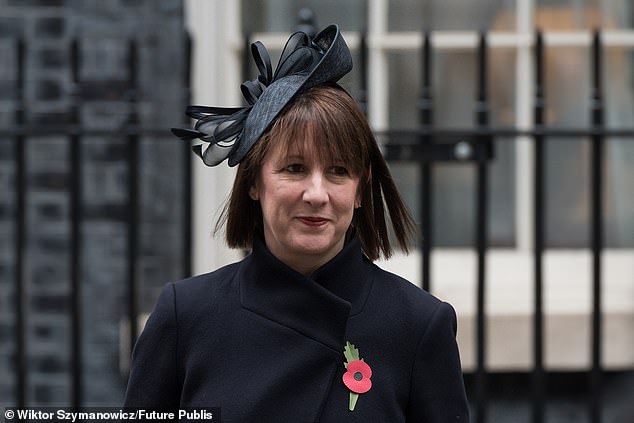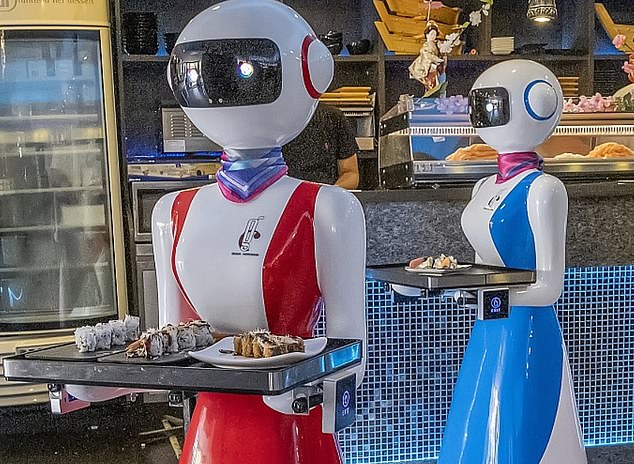Table of Contents
Rachel Reeves has been warned that companies will replace more staff with robots as a result of their “jobs tax”.
In her first budget last month, the Chancellor increased national insurance contributions paid by employers in a £25bn tax raid on businesses.
The measure – branded a ‘jobs tax’ that violated Labour’s manifesto commitment not to increase national insurance – has sparked outrage among critics who warn it will hit hiring and wages.
Companies facing difficult decisions about their staff costs will increasingly turn to technology, according to a report by analysts at investment bank RBC Capital Markets.
Companies facing difficult decisions about their staff costs will increasingly turn to technology, according to a report by analysts at investment bank RBC Capital Markets.
Highlighting the impact of Labour’s budget bombshell on the high street, the report said: “We believe this will result in greater automation (e.g. self-scanning cash registers) and cost efficiencies, and lead to small price increases in the sector”.
The report came as official figures from the Office for National Statistics (ONS) showed unemployment jumped from 4 per cent to 4.3 per cent during Labour’s first three months in power.
Critics said Reeves’ tax raid risks turning the High Street into “ghost towns” as pubs, restaurants and shops close earlier and open on fewer days to save money on staff.
Greater automation also means fewer staff on the High Street and more self-scan checkouts and QR code menus in place.
Labor promised in its manifesto to “breathe life” back into the high street and reform the hated business rates system.
But business rates remain unchanged, and with increased national insurance and minimum wage increases, as well as new workers’ rights, this will cost businesses £5 billion.
Primark, which employs 29,000 people in 191 stores in the UK, has said it will use more self-checkouts in stores and robots in warehouses to cut costs and keep prices low.
Boss George Weston said last week he hopes to have fewer staff “within a year” thanks to automated technologies after warning the budget has racked up “tens of millions” of pounds in costs for his business.
Mark Selby, chief executive and co-founder of Mexican restaurant chain Wahaca, said that since the Budget he has been “inundated” with offers from technology companies to replace human workers.
He told the Mail: ‘Hospitality is about creating a pleasant experience for people.
“But more and more people are asking, ‘why not look at robots and different ways of having a workforce?'”
Labour’s treatment of his industry feels “completely unacceptable” and further calls into question the Chancellor’s claim that her budget would “protect workers”, the restaurant owner said.
Selby added: “It feels very poorly thought out. You don’t create economic growth by hitting the largest groups of workers and making it difficult for them to grow.”

Employment tax: In her first Budget last month, Chancellor Rachel Reeves (pictured) increased national insurance contributions paid by employers in a £25bn tax raid on businesses.
Luke Johnson, president of bakery chain Gail’s, said the decision to increase the cost of doing business “only contributes to the decline of urban centers.”
The Night Time Industries Association (NTIA), which represents bars and clubs, has warned that four in ten of its members are at risk of closing within six months.
Michael Kill, chief executive of the industry group, said: ‘The Budget has effectively signed a death knell for many night-time economy businesses across the UK.
“This sector is on the brink of the abyss.”
Andrew Goodacre, chief executive of the British Independent Retailers Association, which together represents 8,500 stores across the country, said: “Our members have already told us they will be forced to reduce staff hours, reduce headcount and reduce business hours.
“In short, the Budget has made the revitalization of high streets, a key mission for this Government, much more difficult.”
Shadow business secretary Andrew Griffith said: “Labour’s tax rise means the only way hospitality businesses can balance their books is with fewer hours, fewer staff or both.”
—That will make our main streets look like ghost towns many nights a week.
“It’s only been a few months, but under the Labor Party the lights are literally going out.”
Several companies have warned that the budget measures will increase costs.
Tesco reported a rise of £250m a year, Sainsbury’s will see a rise of £140m and Marks & Spencer £120m.
Retail expert Jonathan De Mello, founder of JDM Retail, said: “Automation and push payments are likely to see greater prevalence given the changes to national insurance planned by the Government.”
DIY INVESTMENT PLATFORMS

AJ Bell

AJ Bell
Easy investing and ready-to-use portfolios

Hargreaves Lansdown

Hargreaves Lansdown
Free Fund Trading and Investment Ideas

interactive inverter

interactive inverter
Fixed fee investing from £4.99 per month

sax

sax
Get £200 back in trading fees

Trade 212

Trade 212
Free trading and no account commission
Affiliate links: If you purchase a This is Money product you may earn a commission. These offers are chosen by our editorial team as we think they are worth highlighting. This does not affect our editorial independence.
Some links in this article may be affiliate links. If you click on them, we may earn a small commission. That helps us fund This Is Money and keep it free to use. We do not write articles to promote products. We do not allow any commercial relationship to affect our editorial independence.


